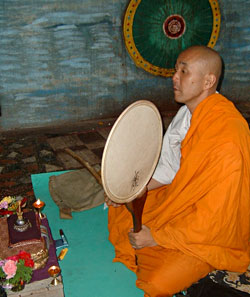|
|
As Bhikhshu T Sato chants the Lotus Sutra and softly beats a drum, he faces the massive wall and swaying bamboo groves that hide Narayanhiti Palace from view. In between chants, the Japanese monk has this to say: "You have to open your eyes and minds, the time is coming. Life here is unbalanced-a few people have many things, and the majority of people are still poor."
The resident monk at the Nipponzan Myohoji World Peace Pagoda in Lumbini came to Kathmandu two weeks ago. Sato and two other monks prayed at Bouddhanath for four days, and after his colleagues returned he decided to stay feeling that this is an important time. "I believed that after four days something would change but it didn't, that's why I'm still fasting," Sato says from his prayer mat where he has set up a small altar in one corner of the park at Nagpokhari.
The monk's day of prayer starts at 5AM and ends at 6.30 PM, when he goes to the house of a nearby resident. He doesn't eat or drink during the day and sips water only at night, a routine he plans to follow for 21 days. "We are very happy that a foreigner came here and is praying for the peace that Nepalis have been unable to create," says the monk's host Manoj Tamrakar.
Asked if he believes Sato can bring peace, Tamrakar says he prefers the monk's approach to the ongoing street battles. "His steps will lead to peace, fighting among brothers will not."
Sato himself is clear about why he has to do this. "I'm Buddha's disciple. I'm not political. Buddha teaches non-violence so I have to teach non-violence, this is my duty," he says.
This afternoon, rain simmers on the surface of Nagpokhari, a positive sign, according to Sato but few people are sitting on the benches surrounding the pond. On other days he has greeted numerous visitors. "Many people come to pray. They don't know how to pray but they sit and namaste and automatically they feel something."
Fifty metres away, two soldiers cradle M-16s and keep a vigil on the eastern wall of the palace. "They don't say anything but they feel it too," says Sato. "They are friendly people, they're human beings. We're all human beings, even the king."



